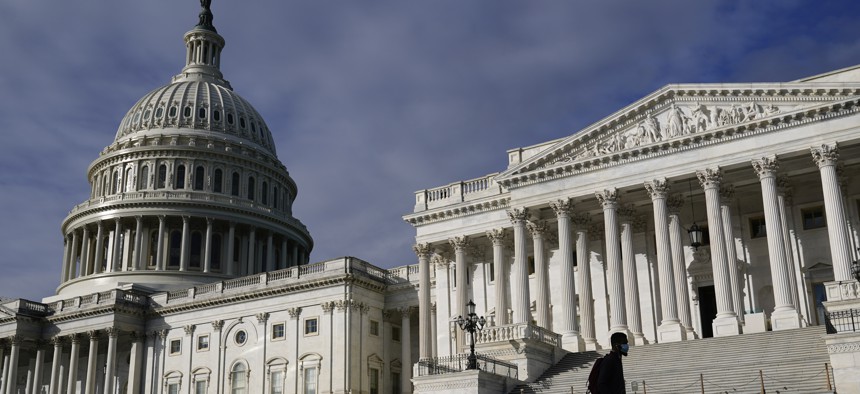House Prepares for Votes on Social Spending, Infrastructure Bills

AP Photo/Patrick Semansky A man walks past the the U.S. Capitol, Wednesday, Oct. 27, 2021, on Capitol Hill in Washington.
Paid family and medical leave was introduced to the latest House version of the $1.75 trillion package.
House Democrats are preparing for a vote on the $1.75 trillion social spending measure that now includes paid family and medical leave—capping off months-long negotiations between progressives and moderates that held a Senate-approved infrastructure bill hostage.
With Democrats stinging from Republicans' win in Virginia’s gubernatorial race this week, which they worry could foreshadow similar losses for the party in the midterm elections, lawmakers were eager to get President Biden’s agenda back on track.
House Speaker Nancy Pelosi declined to outline a timeline for action on the Build Back Better Act or a separate $1 trillion infrastructure bill, during a press conference Thursday. But House leaders worked late into the night Thursday preparing for a possible Friday vote on the social spending package, which would then head to the Senate.
Pelosi stressed Thursday that Democrats were close to consensus with about 90% of the bill written and agreed on as they worked to rally the votes for both spending packages.
“We’re going to pass both bills. But in order to do so, we have to have votes for both bills," Pelosi said.
Earlier in the day, House Majority Leader Steny Hoyer sent a message to Democrats alerting them that votes on the two measures could take place as soon as Thursday.
Biden and Democratic leaders released a draft bill outlining the $1.75 trillion proposal last week, which cut the cost of the original budget reconciliation framework by about half. Significant investments in climate initiatives, health care programs, housing and education were included in the bill. But a provision providing paid family and medical leave was cut amid opposition from Democratic Sen. Joe Manchin.
The Senate is split 50-50 between Democrats and Republicans, meaning a defection by any Democratic senator could sink legislation. Manchin and Sen. Kyrsten Sinema, both moderate Democrats, have used the outsize influence to negotiate down the cost of the legislation.
The latest draft of the proposal includes four weeks of paid family and medical leave.
“I think this is appropriate for this legislation. It fits very comfortably with child care, home care,” Pelosi said. “It has the full support of our caucus.”
Paid leave advocates said they were shocked by the removal of the paid leave provision from the spending proposal and applauded its reintroduction to the bill.
“Paid leave is a unifying and much-needed policy that addresses multiple overlapping crises and trends,” said Vicki Shabo, a senior fellow for paid leave policy at New America. “It means more security and stability for working families, businesses and the economy alike.”
Asked whether she was concerned if the paid leave provision would later be cut by Senate lawmakers, Pelosi said there was no reason not to try to include it.
“It’s no sacrifice for anybody to vote for something that might not see the light of day,” she said.
Disagreements among moderate and progressive Democrats over the cost of the entire spending plan have for months threatened to derail the package.
Democrats continued Thursday to try to assuage their colleagues' concerns about the cost of the bill and how it would be paid for. Pelosi touted a new report from the Joint Committee on Taxation, which analyzes the revenue effects of legislation on Capitol Hill, that found tax-increase provisions in the bill would raise about $1.5 trillion over 10 years. She said the analysis does not include other pay-fors, including drug pricing savings and enhanced IRS enforcement that are estimated to raise an additional $650 billion—enough to cover the cost of the bill.
Andrea Noble is a staff correspondent with Route Fifty.
NEXT STORY: 4 Strategies States Can Use to Confront the Child Care Crisis





